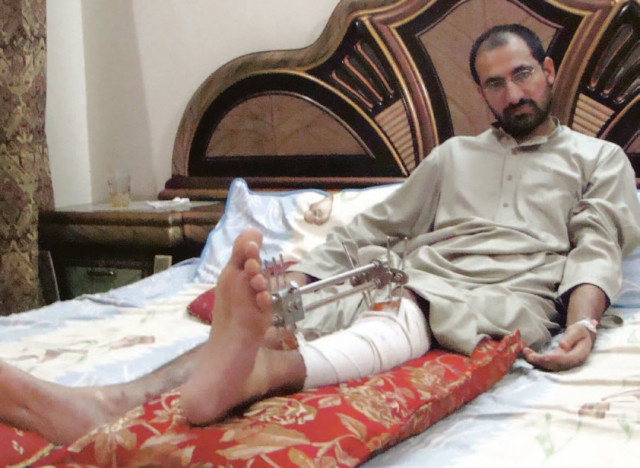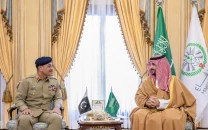Compensating a loss: Officer down
When it comes to compensating the families of fallen police officers, it’s the police welfare dept that cops out.

Samina’s eyes well up with unshed tears when she recalls her husband’s death. “For over a year I could not believe that Asghar was gone,” she says. “He had left for work early in the morning and around noon we got news that there had been a blast at GPO Chowk… and that he was dead.”
Seventeen policemen lost their lives in this suicide attack, the first major terrorist attack in Lahore.
Now, more than three years later, Samina is still struggling to live a normal life. She has to bear the burden of four children. “When Asghar died, everything finished for me,” she says. “If it was not for my children, I may have lost my mind.”
Samina received Rs500,000 as compensation for Asghar’s death, as per the entitlement policy for police martyrs, but she says the amount just isn’t enough. “Even the free education program the department announced for martyrs’ children is all talk,” she says. “I spent Rs200,000 on fees last year, but only Rs45,000 were reimbursed. Asghar really wanted our children to be educated; now I don’t know how I will fulfill his dream.”
In late 2008 a new policy was announced that declared that martyrs’ families would get Rs3 million. “My in-laws keep calling me and say that I am lying to them, they say that I took this money from the government. But if I did, would I be living like this?” she asks.
Still living in her parents’ modest two-room house, she hopes that the police welfare department will provide her family with a home. “Shahbaz Sharif promised houses for all police martyrs, but when I inquired about this at the police welfare department, they asked me to file an application — and then the official there literally told me to ‘forget about it’.”
Fast forward to 25th January 2011, and it seems that the situation has not changed much. That day Mohammad Naveed, a 31-year-old ASI in the Lahore police, was on duty at Urdu Bazar Chowk with three of his other fellow officers when a suicide bomber blew himself up.
“God help me, God help me!” was the message that many heard on police wireless sets on that fateful January day.
“Calm down, officer!” someone replied sternly on the other side.
This is the last thing Naveed remembers. “I was lucky,” he says. “I had returned to my vehicle to hear a message on the wireless. Just as I was about to respond, there was a huge explosion.”
His fellow officers, standing outside the police van, were all killed. Naveed was rushed to the nearby government hospital.
“When I saw him for the first time, I lost consciousness,” says Bashir Ahmed, Naveed’s father. “He was badly injured. My only son lay in front of me, struggling for life.”
A few weeks passed, and Naveed’s leg had still not healed. Despite that, he was told by hospital staff that he had to leave after one month, and he was forced to avail private treatment.
With four surgeries, and a daily expenditure of Rs5,000 on injections alone, his treatment has cost him over Rs700,000 so far. He has been regularly sending bills to his department but they have not been of much help. He received the Rs300,000 he was entitled to, but beyond that he has had problems justifying his medical expense to his superiors. Naveed says that the entitlement was exhausted in a matter of days. “I had to pay back my loans and even now I am borrowing from my extended family,” he says.
Head of the Punjab Police Welfare and Finance Department Additional IG Aftab Sultan says that, paradoxically, due to increased salaries for the Punjab Government, support for victims like Naveed has lessened. “I try to accommodate each case that comes to me but it is up to the district police officer to actually pursue them,” he says.
When asked about Naveed’s and Samina’s cases, he said he would look into them. “But I cannot do much about older cases. That’s just how it is,” Sultan adds.
He agrees that there are problems in the system but says that because he only has a nine-person team and limited resources, he cannot do much. “Managing a huge police force is tough when funds are limited,” Sultan concludes.
Naveed and Samina are not the only people who need attention. Many other policemen’s families have similar stories to tell, even though the AIG’s department claims they have no cases pending.
Samina believes that the middle tier of the police force creates a hurdle to those asking for adequate compensation. Sitting beside her, one of her sons becomes teary-eyed, but the tears are of rage, not sorrow. Squeezing his mother’s hand, he says: “My father wanted to serve the country, but what did we get for it — nothing!”
Published in The Express Tribune, Sunday Magazine, August 7th, 2011.



















COMMENTS
Comments are moderated and generally will be posted if they are on-topic and not abusive.
For more information, please see our Comments FAQ